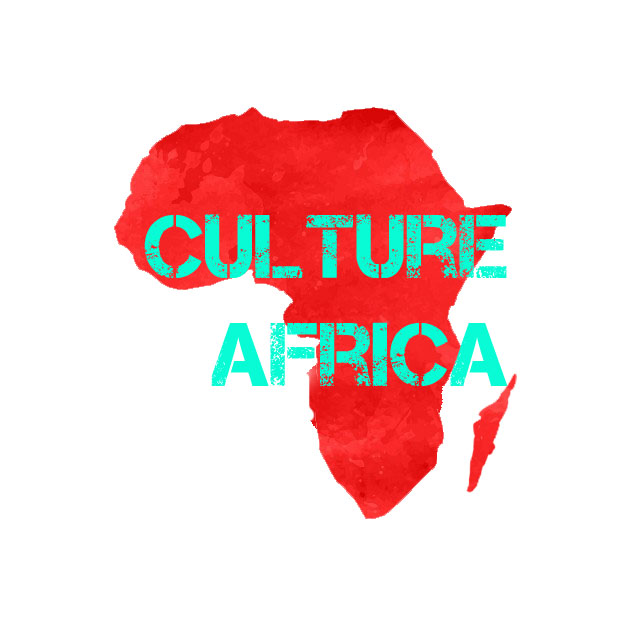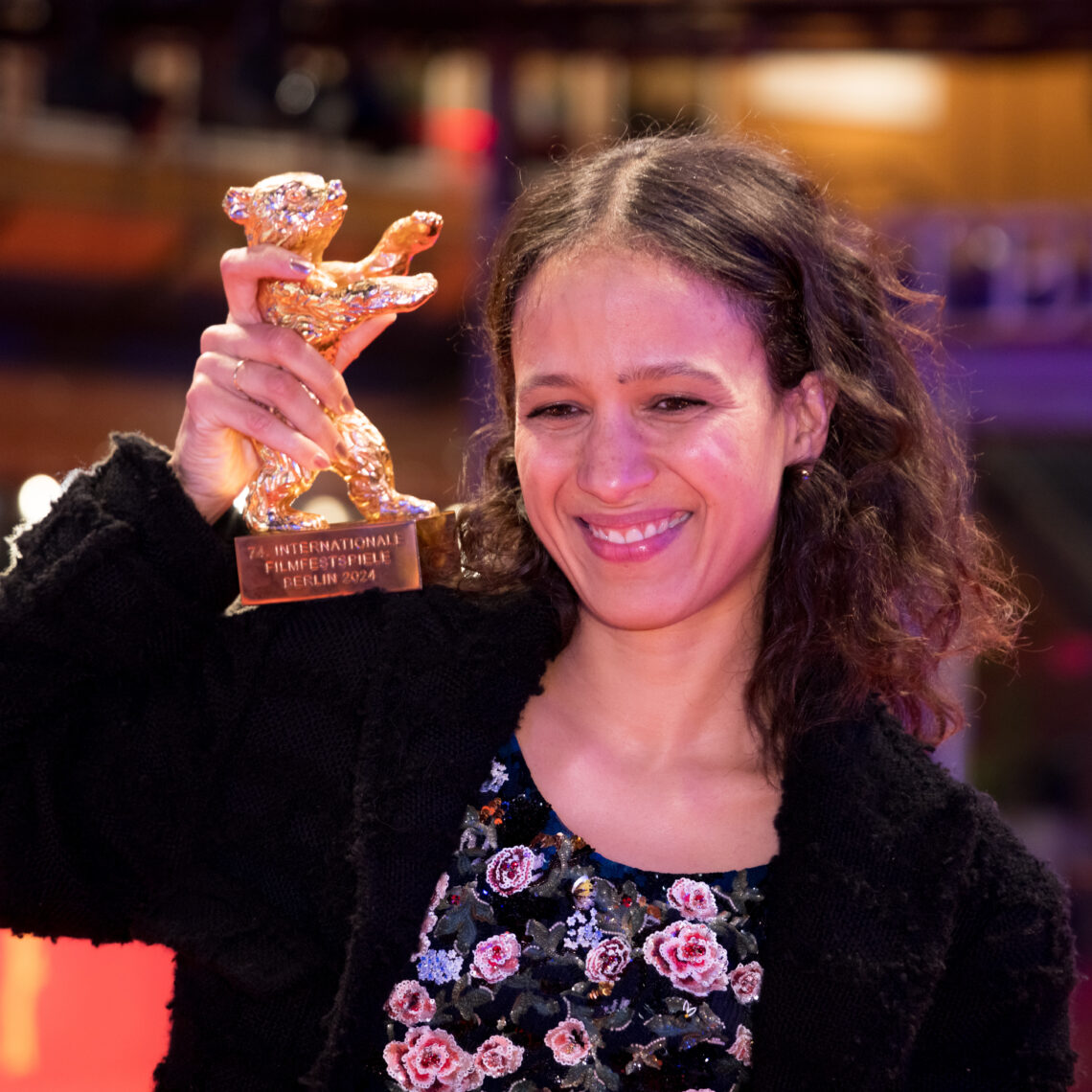
Successful this time! International German Film Festival Berlinale 2024 and Africa deutsch-english
Which Way Africa? ist der Titel eines Films des kongolesischen Regisseurs David-Pierre Fila, der auf der Berlinale läuft. Die 74. Ausgabe der Berliner Filmfestspiele ist dieses Jahr unter dem Vorsitz der kenianischen Schauspielerin Lupita Nyong’o gestartet. Es ist eine bemerkenswerte Entscheidung , Nyong’o als Juryvorsitzende zu wählen, verstellt aber nicht den Blick, dass Filme aus Afrika unterrepräsentiert sind.
FOR ENGLISH VERSION PLEASE SCROLL DOWN
Aber mindestens zwei Filme im Wettbewerb haben mit ihren Inhalten die Jury überzeugt. Über die Form und Ästhetik wurde heiß diskutiert. Dennoch: der Hauptpreis “Goldener Bär” geht an den Film DAHOMEY der französisch-senegalesischen Regisseurin Mati Diop. Das gilt weithin als Sensation, ist es doch ein künstlerischer Dokumentarfilm, der etwas sperrig aber doch auch eindrucksvoll das Thema Restitution von Raubkunst zum Thema hat. Und das quasi in der “Höhle des Löwen”. Ausgerechnet oder gerade weil Berlin der Ort ist, an dem viel dieser Raubkunst lagert, wo die Diskussionen darüber seit langem immer wieder hoch kochen. Wo aber auch erste konkrete Schritte in Richtung Rückgabe gemacht wurden.
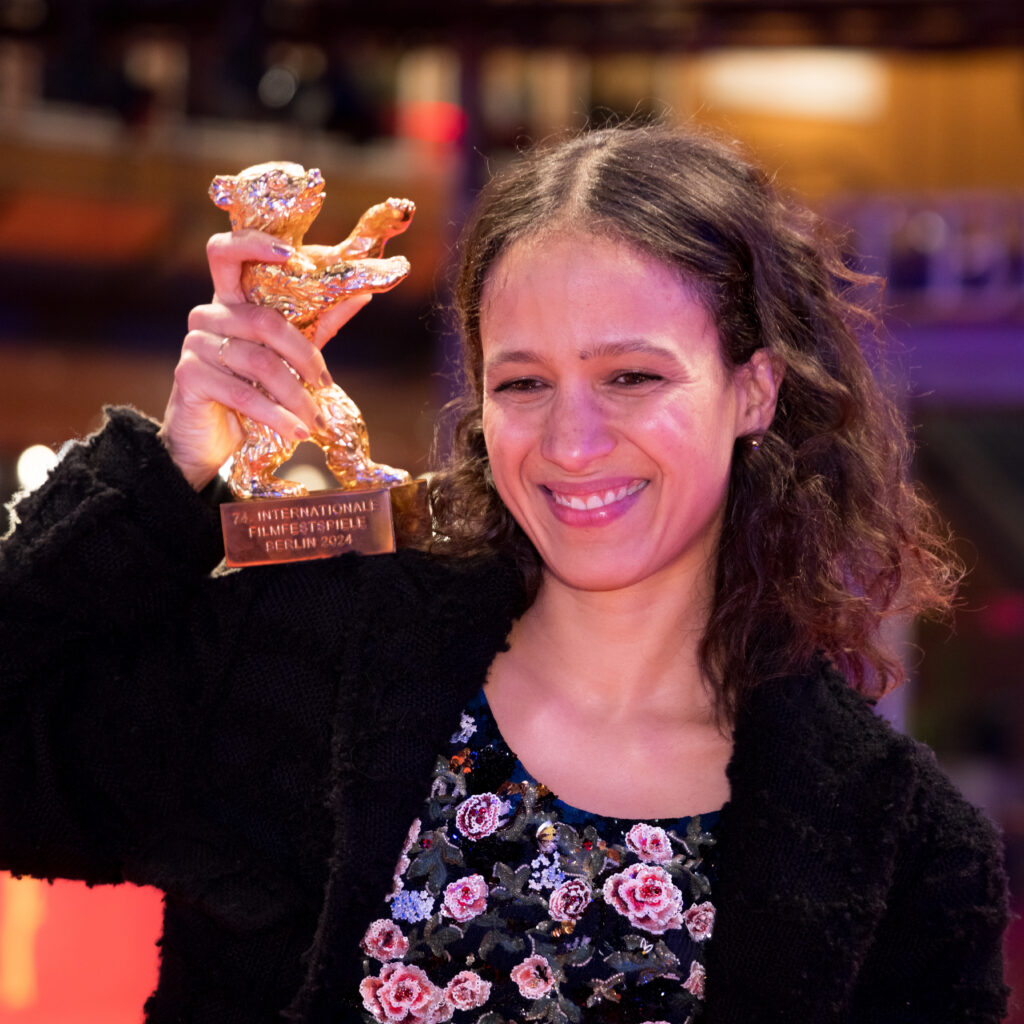
Auch PEPE, der mit dem “Silbernen Bären” ausgezeichnet wurde, hat auf verstörend poetische Art das Thema Dekolonisierung zum Thema. Ein Film auch mit Beteiligung Namibias. Umstritten ist auch dieser Film. Überraschend, dass er sich dennoch durchgesetzt hat. Gegen hochkarätige Konkurrenz.
Die Berlinale, wie das Festival genannt wird, ist ein europäisches Festival. In der Vergangenheit haben afrikanische Produktionen eine eher nebensächliche Rolle gespielt. Im Zuge herausragender Produktionen vom Kontinent, der wachsenden Aufmerksamkeit für aus Afrika stammenden Schauspieler: innen, Produzent: innen, Musiker: innen und Regisseur: innen, beteiligt auch an internationalen Co-Produktionen, kann Afrika schlichtweg nicht mehr übergangen werden. Das Berliner wie internationale Publikum ist gierig auf interessante Filme, schon jetzt sind fast 80.000 Kinotickets verkauft. 200 Filme werden gezeigt. Wie sieht es also konkret aus, beim größten Publikumsfestival der Welt?
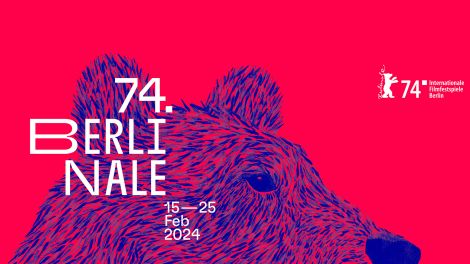
Neben Lupita Nyong’o ist zumindest in einer anderen Jury (es gibt mehrere Sektionen), der “Generation” Jury ein Sudanese vertreten: der Regisseur Amjad Abu Alala.
Die wichtigste Sektion bei jedem Filmfestival ist der Wettbewerb. Hier werden die wichtigsten Preise vergeben, der “Goldene Bär”, der “Silberne Bär”. Im Wettbewerb halten sich, nach Worten des Leiters Carlo Chatrian, “lang geschätzte Filmemacher*innen und starke neue Stimmen des unabhängigen Kinos die Waage. Ein wichtiger Aspektist die Vielfalt der Geschichten, die erzählt werden, und der Menschen, die sie erzählen. Beinahe noch spannender ist jedoch der stilistische Reichtum, der die weitreichenden Möglichkeiten unterschiedlicher Filmsprachen aufzeigt”.
Zwanzig Filme sind im Wettbewerb vertreten, drei sind mit afrikanischer Beteiligung.
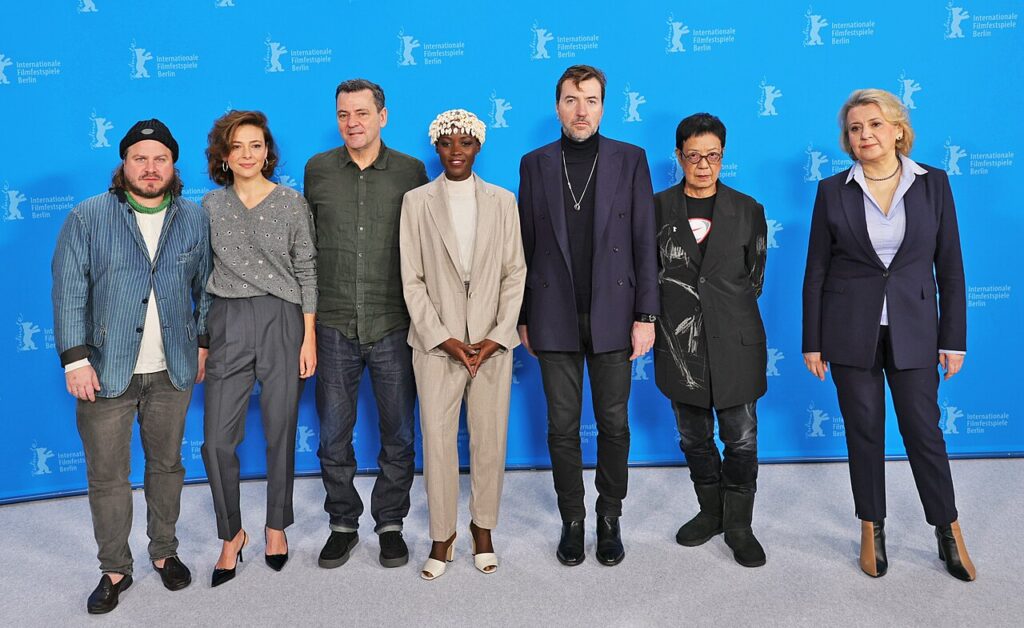
Vertreten ist die Produktion BLACK TEA von Regisseur Abderrahmane Sissako, erzählt die transkulturelle Liebesgeschichte zwischen einer ivorischen Frau (Nina Mélo) und einem Teehausbesitzer. Der Film wurde in Taiwan gedreht und war eine Zusammenarbeit zwischen Frankreich, der Elfenbeinküste, Luxemburg, Mauretanien und Taiwan.
Aya, eine junge ivorische Frau, sagt an ihrem Hochzeitstag zum Erstaunen aller Nein. Sie lässt die Elfenbeinküste hinter sich und beginnt ein neues Leben in Guangzhou, China. In einem pulsierenden Viertel, in dem die afrikanische Diaspora auf die chinesische Kultur trifft, arbeitet sie in einem Tee-Laden. Der chinesische Besitzer Cai weist Aya in die traditionelle Kunst der Teezeremonie ein und langsam entwickelt sich eine zärtliche Liebe zwischen den beiden. Doch kann ihre Beziehung die Wirren ihrer Vergangenheit und die Vorurteile der anderen überstehen?
Hier ist der Trailer: https://www.kino-zeit.de/film-kritiken-trailer-streaming/black-tea-2024#lg=1&slide=0
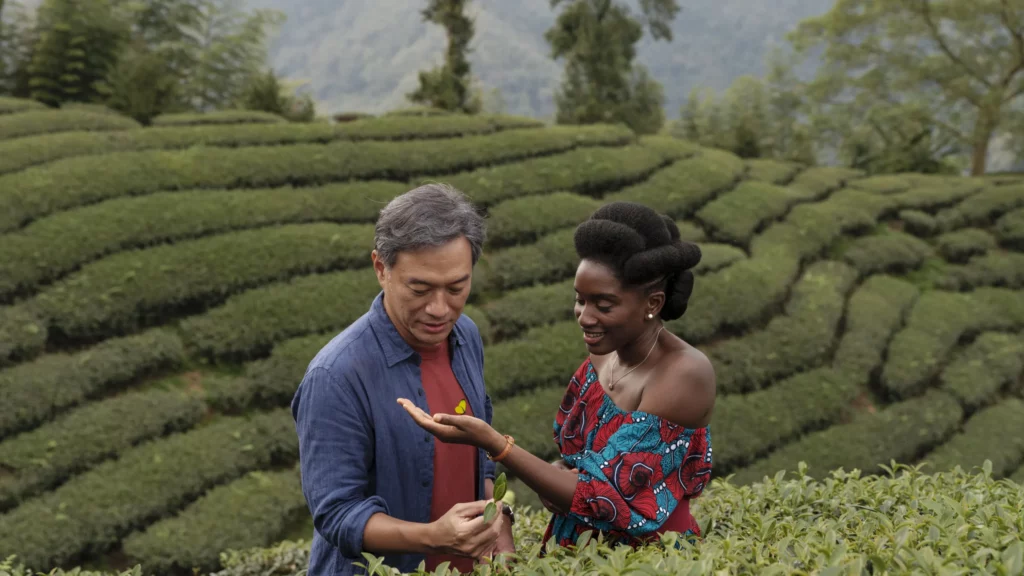
Ebenfalls dabei: der spannende Dokumentarfilm der französischen Regisseurin Mati Diop, DAHOMEY, der die Restitution von Frankreich geraubter Kunstschätze nach Westafrika zum Thema hat. Produktionsländer: Frankreich, Senegal und Benin. Eine (West)- afrikanische Sicht auf die hoch politische Restitutionsdebatte. Dass dieser Film im Wettbewerb läuft, kann als kleine Sensation betrachtet werden.
Mati Diop stammt aus der berühmten Diop-Familie, der Musiker, Filmemacher und andere Künstlerinnen angehören. Sie stammen aus dem Senegal. Mati Diop, die zuletzt mit ihrem Migrations-Drama ATLANTIQUE, einem Spielfilm, überzeugen konnte, stellt sich auch in DAHOMEY gegen gewohnte Dokumentarfilm Sehgewohnheiten. Nicht alle finden das natürlich überzeugend. Diop arbeitet mit Schwarzbildern, mit Titeln, Kunstobjekte werden nicht erklärt. Aber auch ATLANTIQUE bezog seinen Reiz durch das Unerklärliche, das Abwesende. Sie ist eine Poetin der Filmkunst.

The Press Conference you can see here: https://www.berlinale.de/de/2024/programm/202414781.html
PEPE erzählt die erstaunliche Geschichte des Nilpferds, das eine Stimme hat. Das einzige Nilpferd, dass auf dem amerikanischen Kontinent gejagt wurde. Es war im Privatzoo des Drogenbarons Carlos Escobar, ist dann ausgebrochen. What, fragt man sich? Möglicherweise spannend, möglicherweise daneben. Wir werden sehen. Regisseur ist Nelson Carlos De Los Santos Arias aus der Dominikanischen Republik, eine Produktion der Dominikanischen Republik, Namibia, Deutschland und Frankreich. Es ist übrigens ein Spielfilm. Bei der Presse kam der Film überigens nicht so gut an. Ulrich Seidler von der Berliner Zeitung schreibt : “das Werk aus schwer entschlüsselbaren bis kaum sichtbaren Bildern, einer stockenden und ausfransenden Erzählweise, die sich immer wieder in die Welt der Zweibeiner verläuft. Das liegt nun aber gar nicht am mangelnden Ausdrucksvermögen des Tieres, sondern an der Eitelkeit derer, die es sich für ihre Kunst aneignen. “
Auch außerhalb des Wettbewerbs werden neue Produktionen vor großem Publikum und der Presse gezeigt. Das Berlinale Special ist eine solch hochkarätige Sektion. Fast alle Vorstellungen, auch die Wiederholungen sind meist ausverkauft. Das ist typisch für Berlin. Es gibt während der Berlinale ein interessiertes Publikum für Filme aus aller Welt. Oft sind die Produzent: innen und Schauspieler: innen anwesend.
Die Jordanische Produktion A STRANGERS CASE von Regisseur Brandt Andersen, ist mit dem Französisch-Senegalesischen Star-Schauspieler Omar Sy besetzt. Man kennt ihn vor allem aus dem Hit ZIEMLICH BESTE FREUNDE. In der aktuellen Produktion geht es um eine Tragödie in Syrien, die eine Kettenreaktion in verschiedenen Ländern auslöst.
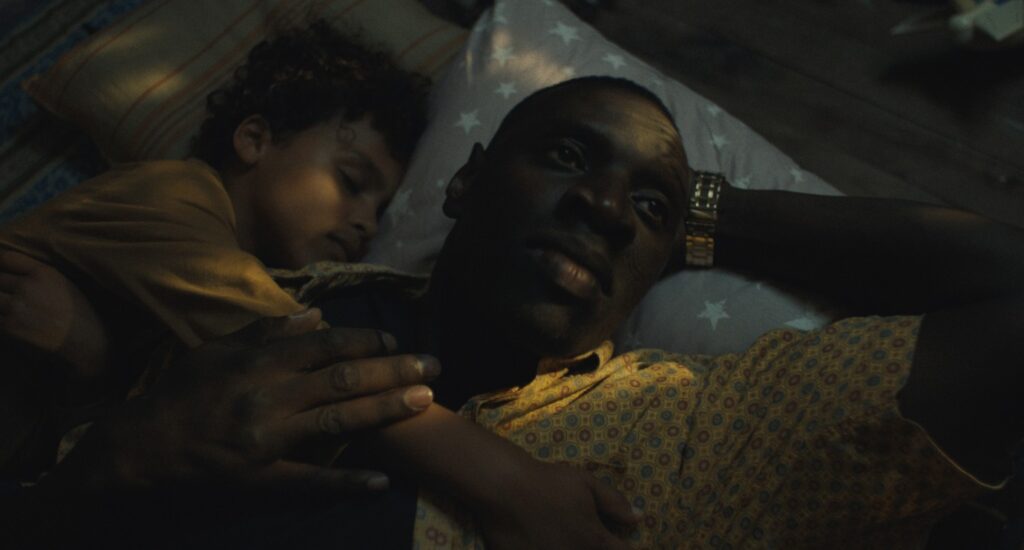
“Die Filme in der Sektion Encounters unterlaufen die Erwartungen, nach denen wir Filme häufig kategorisieren. Erkundungsreisen ins Surreale, Geschichten voller Ironie, sentimentale Komödien, beobachtende Dokumentarfilme, Parabeln und therapeutische Anordnungen sind nur einige Facetten des Spektrums, das hier
ausgebreitet wird. Zusammengenommen zeichnen alle 15 Filme ein vielschichtiges Bild von der Welt im 21. Jahrhundert in ihrer Schönheit wie auch in ihrer Tragik.” Carlo Chatrian
Hier läuft DEMBA, ein Drama von Mamadou Dia aus dem Senegal. Mit Awa Djiga Kane, Ben Mahmoud Mbow und Mamadou Sylla. Eine Produktion aus Deutschland, Senegal und Katar (!) Ein Portrait über Mamadou gibt es hier: https://www.berlinale-talents.de/bt/talentpress/v/mentors-talk-mamadou-dia-a-character-is-something-you-have-to-be-able-to-follow
Inhalt: Demba steht kurz vor der Pensionierung. Er muss erkennen, dass es ihm nicht gelingt, über den Tod seiner Frau hinwegzukommen. Während er auf unbeholfene Weise versucht, mit widersprüchlichen Gefühlen umzugehen, entdeckt er die Beziehung zu seinem Sohn neu.
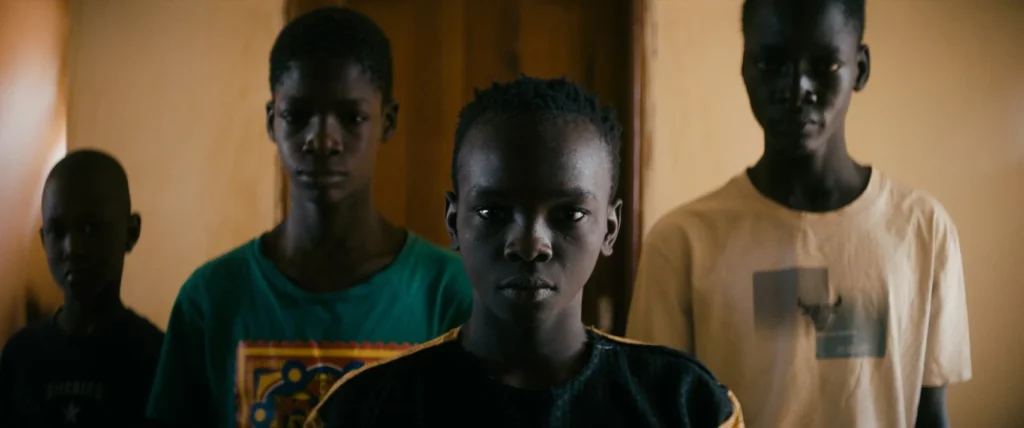
Das Panorama ist seit vielen Jahren der wahre Schatz der Berlinale. Hier laufen schon immer internationale Entdeckungen, die manchmal den Kinomarkt erobern. Nicht wegzudenken vom Berliner Festival. Michael Stütz, Head of Panorama:
“The 2024 Panorama is shaped by the search for belonging, identity and emotional security. Grief and loss are constant companions, and yet there is no sense of
resignation in this year’s selection. Whether documentary, fictional or hybrid: the films in this year’s programme express their attitudes in many voices and build bridges between lived experiences and cinematic possibilities. They inspire us to look to the future. In 24 frames per second, the filmmakersurge us to listen and understand. “
Hier findet sich der Film À QUAND L’AFRIQUE?/Which Way Africa? vom vielfach ausgezeichneten kongolesischen Regisseur David-Pierre Fila, mit Samuel Fosso, Joseph Ki-zerbo, Simon Njami. Eine Produktion der Republik Kongo, Angola und Kamerun .
Der Inhalt klingt nach westlichen Stereotypen über Afrika, aber: es ist kein westliches Land beteiligt: Die Menschen im Wald schlagen ihre Trommeln, um ihre Gesänge am Leben zu halten. Die in der Stadt kreischen: „Fortschritt!“ Und es kommen immer
mehr, um sich der Schätze des Landes zu bemächtigen. Doch sie werden von neuen Stimmen des Widerstands empfangen. Immer ist es die Stimme Afrikas selbst, die zu hören ist. Ein emotionales Plädoyer von Afrikaner*innen, die für die Zukunft ihres Kontinents kämpfen und an sie glauben.

Ebenfalls aus dem Kongo (wo sind eigentlich Nigerianische Produktionen?) stammt der Dokumentarfilm TONGO SAA von Nelson Makengo ∙ Demokratische Republik
Kongo, Belgien, Deutschland, Burkina Faso und Katar.
Es ist ein feinsinniges Porträt der Bewohner*innen von DR Kongos Hauptstadt Kinshasa, die sich in einem Umfeld, das von Gewalt geprägt ist, und mit Blick in ein ungewisses Morgen den Herausforderungen des Lebens stellen.
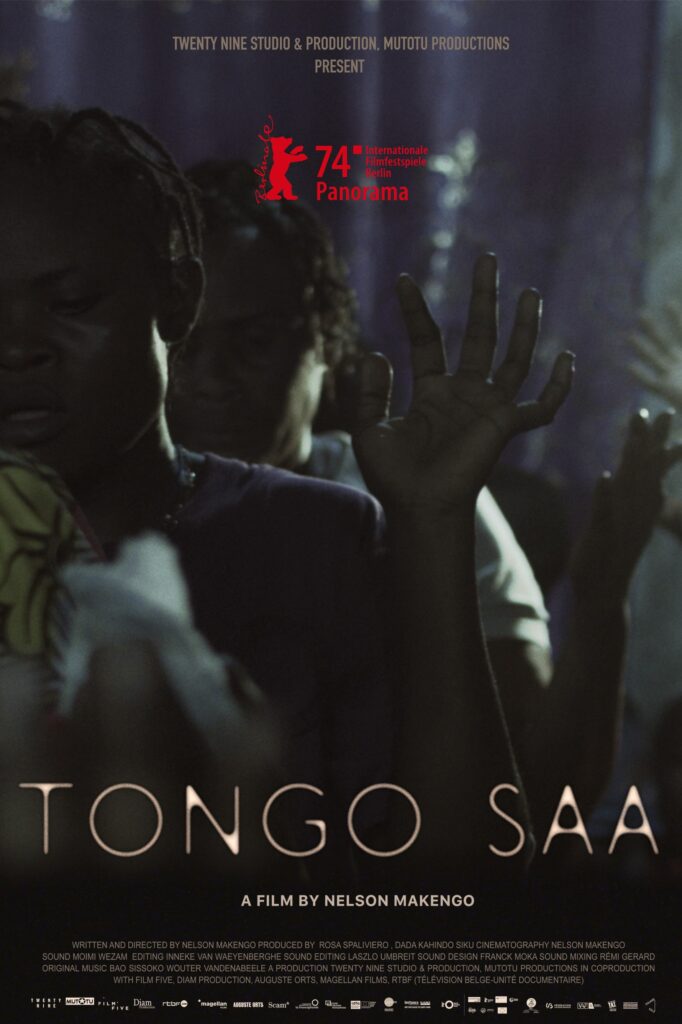
Es gibt auch noch das FORUM, mehrheitlich dem Dokumentarfilm gewidmet. Ja wer durchschaut die vielen Sektionen, könnte man fragen. Es wird wohl bald etwas gerafft, damit man den Überblick nicht verliert. Im Film mit dem vielleicht längsten Filmtitel der Welt, einer Algerisch-Französischen Produktion, geht es um Dekolonialisierung in Algerien und um: Franz Fanon. Da der Titel alles erklärt, wird von einer Inhaltsangabe abgesehen.
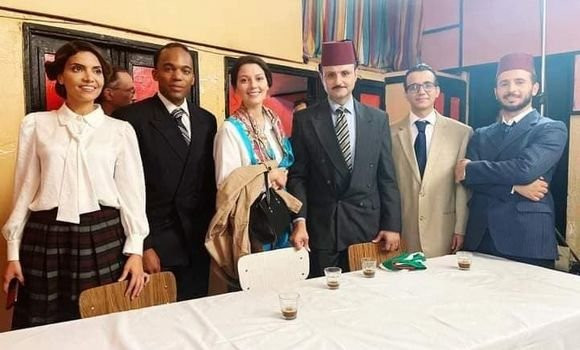
CHRONIQUES FIDÈLES SURVENUES AU SIÈCLE DERNIER À L’HÔPITAL PSYCHIATRIQUE BLIDA-JOINVILLE, AU
TEMPS OÙ LE DOCTEUR FRANTZ FANON ÉTAIT CHEF DE LA CINQUIÈME DIVISION ENTRE 1953 ET 1956
True Chronicles of the Blida Joinville Psychiatric Hospital in the Last Century, when Dr Frantz Fanon Was Head of the Fifth Ward between 1953 and 1956
Abdenour Zahzah ∙ Alexandre Desane, Gérard Dubouche,
Nicolas Dromard ∙ Algerien, Frankreich
Im französischen Dokumentarfilm L’ HOMME-VERTIGE/ Tales of a City vom Debutfilm des Regisseurs Malaury Eloi Paisley sehen wir den Abriss trostloser Wohnsiedlungen im karibischen Guadeloupe.
L’homme-vertige folgt in nächtlichen Streifzügen den Irrenden der Stadt durch die leeren Straßen. Es sind Zustände des Schwindels. Sie alle tragen die Wunden dieser Stadt in sich und sind zu Sehenden geworden. In den inneren und äußeren Räumen, beide gefährdet, zirkulieren die empathischen Gespräche und Beziehungen der Regisseurin – mit dem lungenkranken ehemaligen Befreiungskämpfer Ti Chal, mit der von Crack betäubten Priscilla, mit dem wilden, wütenden und dann wieder zahmen Eddie, mit dem Fischschupper Karpèch, sagt der Film-Verleih.
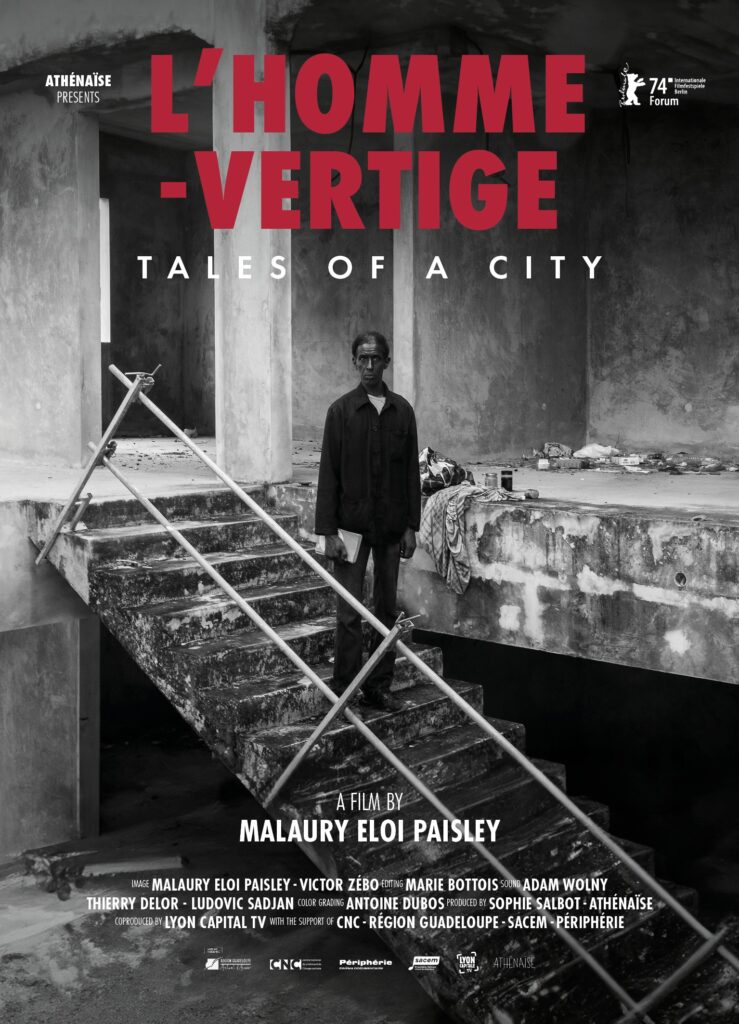
Der Film AS NOITES AINDA CHEIRAM Á PÔLVORA /The Nights Still Smell of Gunpowder ist eine Spurensuche. Im Film sehen wir die Rückkehr des in Portugal lebenden Inadelso Cossa ins Dorf der Großeltern. Eine Reise in die vom jahrelangen Bürgerkrieg gezeichneten Land im Südosten Afrikas.
Inadelso Cossa hat diesen Dokumentarfilm gedreht. Mit Inadelso Cossa, Maria Estevão, Moises Langa ∙ Mosambik, Deutschland, Frankreich, Portugal,
Niederlande, Norwegen.
Ebenfalls dokumentarisch ist der Film aus Guinea-Bissau. RESONANCE SPIRAL von Filipa César und Marinho de Pina. Portugal, Guinea-Bissau,
Deutschland.
Gezeigt wird die sogenannte Mediateca Onshore in Malafo, einem Dorf in Guinea-Bissau. Eine Gruppe arbeitet gemeinsam daran, das audiovisuelle Gedächtnis an die Befreiungsbewegung in Guinea-Bissau zu rekonstruieren und öffentlich zugänglich zu machen. Die Zusammenarbeit gipfelte im gemeinsamen Bau der Abotcha – Mediateca Onshore in Malafo, einem traditionellen Balanta-Dorf, in dem Sana na N’Hada lebt. Die Mediateca ist heute ein Labor für archivarische Praxis, in dem sich die Community treffen und mit dem Wissen der Vorfahr*innen, der Natur und neuen Technologien in Verbindung treten kann. Vom Tonband spricht Amílcar Cabral über Feminismus, das Regie-Duo in den Mangroven über die Widersprüche des Außenblicks auf die Gemeinschaft.

Die Sektion GENERATION zeigt junge Filmemacher in kürzeren Produktionen.
Zum Beispiel MUNA von Warda Mohamed mit Kosar Ali, Raha Isse Fa. Eine Britische Produktion, in der es um das ferne Somalia geht. ein Land und die Großeltern, die die junge Muna in Großbritannien nie kennengelernt hat.
DISCO AFRIKA: UNE HISTOIRE MALGACHE / Disco Afrika: A Malagasy Story von Luck Razanajaona, verspricht nicht, was der Titel verspricht. Denn es geht um Arbeit in Saphirminen in Madagaskar. Eine Co-Produktion aus Frankreich, Deutschland, Mauritius, Katar und Madagaskar.
Im Forum Special gibt es ein Wiedersehen wichtiger Filme, die sonst nur in speziellen Festivals laufen. Darunter der aus dem jahr 1975 entstandene Film KADDU BEYKAT /Letter from My Village der berühmten senegalesischen Regisseurin Safi Faye. Senegal ∙ 1975 ∙
So schüchtern, aber bestimmt, wie Ngor in dieser wunderbaren doku-fiktionalen Erzählung Coumba liebt,so liebte die vor einem Jahr verstorbene Filmemacherin
Safi Faye das senegalesische Dorf: seine Arbeiter*innen, Hirse und Erdnüsse. Ein Brief vom Lande.

Berlin und die Berlinale würdigt dieses Jahr die Künstlerin, die letztes Jahr verstarb, mit einen speziellen Abend mit Filme aus ihrem Werk. Safi Faye hat einige Zeit in Berlin gelebt, sie war auch öfter auf der Berlinale präsent. Faye war auch Mitglied der Academy of Motion Pictures, die den Oscar vergibt.
Ein Kreis schließt sich, denn Lupita Nyong’o hat als Oscarpreisträgerin viel Qualität und Glanz nach Berlin gebracht. Der Afrikanische Film, den es ja so nicht gibt, aber die Präsenz sieht auf den ersten Blick nicht so schlecht aus. Gemessen an den vielen qualitativ hoch stehenden Produktionen beispielsweise aus Südafrika und Nigeria (jeweils nicht vertreten) ist die Auswahl immer noch dürftig. Bei der Vergabe der Preise wird sich dann auch noch zeigen, was Jury und Publikum entscheiden. Das darf und kann, ja muss sich noch verbessern. Der Weg ist aber bereitet.
Hans Hofele
copyright: cultureafrica 2024
English version
Which Way Africa? is the title of a film by Congolese director David-Pierre Fila, which is screening at the Berlinale. The 74th edition of the Berlin Film Festival started this year under the chairmanship of Kenyan actress Lupita Nyong’o. This remarkable decision to choose Nyong’o as jury president gives us a glimpse of the presence of African actors and especially African productions. The Berlinale, as the festival is called, is, it should be noted, a European festival. In the past, African productions have played a rather minor role. In the wake of outstanding productions from the continent, the growing attention for actors, producers, musicians and directors from Africa, also involved in international co-productions, Africa can simply no longer be ignored. So what does the world’s largest audience festival actually look like? Nearly 80.000 Tickets had been sold yet. All films (200) are shown in their original language with English or German subtitles. Some films you only can see here.
But at least two films in the competition convinced the jury with their content. The form and aesthetics were hotly debated. Nevertheless, the main “Golden Bear” prize went to the film DAHOMEY by French-Senegalese director Mati Diop. This is widely regarded as a sensation, as it is an artistic documentary film that deals with the topic of restitution of looted art in a somewhat unwieldy yet impressive way. And in the “lion’s den”, so to speak. Precisely because Berlin is the place where a lot of this looted art is stored, where discussions about it have been boiling over for a long time. But where the first concrete steps towards restitution have also been taken.

PEPE, which was awarded the “Silver Bear”, also deals with the topic of decolonization in a disturbingly poetic way. A film with Namibian participation. This film is also controversial. Surprising that it has nevertheless prevailed. Against top-class competition.

In addition to Lupita Nyong’o, at least one other jury (there are several sections), the “Generation” jury, includes a Sudanese: director Amjad Abu Alala.
The most important section at every film festival is the competition. This is where the most important prizes are awarded, the “Golden Bear” and the “Silver Bear”. According to the director: “The competition is a balance between long-established filmmakers and strong new voices in independent cinema. One important aspect is the diversity of the stories that are told and the people who tell them. Almost more exciting, however, is the stylistic richness that demonstrates the wide-ranging possibilities of different film languages.” Carlo Chatria
Twenty films are represented in the competition, three of them with African participation.

The production BLACK TEA by director Abderrahmane Sissako, a co-production between France, Mauritania, Taiwan and Côte d’Ivoire, is represented. A drama about a Senegalese woman (Nina Meló) who has emigrated to China and falls in love with the owner of a tea store.
Aya, a young Ivorian woman, says no on her wedding day to everyone’s astonishment. She leaves the Ivory Coast behind and starts a new life in Guangzhou, China. In a vibrant neighborhood where the African diaspora meets Chinese culture, she works in a tea store. The Chinese owner, Cai, introduces Aya to the traditional art of the tea ceremony and slowly a tender love develops between the two. But can their relationship survive the turmoil of their past and the prejudices of others?

Also included: the exciting documentary film by French director Mati Diop, DAHOMEY, which deals with the restitution of art treasures looted by France to West Africa. Production countries: France, Senegal and Benin. A (West) African view of the highly political restitution debate. The fact that this film is screening in the competition can be seen as a minor sensation.

The Press Conference you can see here: https://www.berlinale.de/de/2024/programm/202414781.html
PEPE tells the amazing story of the hippo that has a voice. The only hippopotamus that was hunted on the American continent. It was in the private zoo of drug baron Carlos Escobar, then escaped. What, you ask yourself? Possibly exciting, possibly off the mark. We’ll see. The director is Nelson Carlos De Los Santos Arias from the Dominican Republic, a production of the Dominican Republic, Namibia, Germany and France. Incidentally, it is a feature film. The press ist not so kind to that movie, its irritating, boring, out of this world. But there are many with such an etiquette.
New productions are also shown outside the Competition to large audiences and the press. The Berlinale Special is such a high-caliber section. Almost all screenings, including repeat screenings, are usually sold out. This is typical for Berlin. There is an interested audience for films from all over the world during the Berlinale. The producers and actors are often present.
The Jordanian production A STRANGERS CASE of director Brandt Andersen features the French-Senegalese star actor Omar Sy. He is best known from the hit ZIEMLICH BESTE FREUNDE. The current production is about a tragedy in Syria that triggers a chain reaction in various countries.

“The films in the Encounters section subvert the expectations by which we often categorize films. Exploratory journeys into the surreal, stories full of irony, sentimental comedies, observational documentaries, parables and therapeutic set-ups are just a few facets of the spectrum that is spread out here.
spread out here. Taken together, all 15 films paint a multi-layered picture of the world in the 21st century in both its beauty and its tragedy.” Carlo Chatrian
This is DEMBA, a drama by Mamadou Dia from Senegal. With Awa Djiga Kane, Ben Mahmoud Mbow and Mamadou Sylla. A production from Germany, Senegal and Qatar (!) A portrait of Mamadou can be found here: https://www.berlinale-talents.de/bt/talentpress/v/mentors-talk-mamadou-dia-a-character-is-something-you-have-to-be-able-to-follow
Synopsis: Demba is about to retire. He has to realize that he is unable to get over the death of his wife. As he awkwardly tries to deal with conflicting feelings, he rediscovers his relationship with his son.

Also showing here is the Moroccan-German production DIRECT ACTION by Guillaume Cailleau and Ben Russell. It is a documentary about a radical protest group in France that is protesting against climate change.
The Panorama has been the real treasure of the Berlinale for many years. It has always screened international discoveries that sometimes conquer the cinema market. It’s impossible to imagine the Berlin festival without it. Michael Stütz, Head of Panorama:
“The 2024 Panorama is shaped by the search for belonging, identity and emotional security. Grief and loss are constant companions, and yet there is no sense of
resignation in this year’s selection. Whether documentary, fictional or hybrid: the films in this year’s program express their attitudes in many voices and build bridges between lived experiences and cinematic possibilities. They inspire us to look to the future. In 24 frames per second, the filmmakersurge us to listen and understand. “
Here is the film À QUAND L’AFRIQUE?/Which Way Africa? by award-winning Congolese director David-Pierre Fila, with Samuel Fosso, Joseph Ki-zerbo, Simon Njami. A production of the Republic of Congo, Angola and Cameroon.
The content sounds like Western stereotypes about Africa, but: no Western country is involved: The people in the forest beat their drums to keep their songs alive. Those in the city scream: “Progress!” And more and more
more and more to seize the treasures of the land. But they are met by new voices of resistance. It is always the voice of Africa itself that is heard. An emotional plea from Africans who are fighting for the future of their continent and believe in it.

Also from the Congo (where are the Nigerian productions?) is the documentary TONGO SAA by Nelson Makengo ∙ Democratic Republic of
Congo, Belgium, Germany, Burkina Faso and Qatar.
It is a subtle portrait of the inhabitants of DR Congo’s capital Kinshasa, who face the challenges of life in an environment characterized by violence and with a view to an uncertain tomorrow.

There is also the FORUM, mainly dedicated to documentary film. Yes, who can see through the many sections, you might ask. It will probably be streamlined soon so that you don’t lose track. The film with perhaps the longest film title in the world, an Algerian-French production, is about decolonization in Algeria and about: Franz Fanon. Since the title explains everything, we will refrain from giving a synopsis. The film is over 200min long, one of the longest at this festival.
CHRONIQUES FIDÈLES SURVENUES AU SIÈCLE DERNIER À L’HÔPITAL PSYCHIATRIQUE BLIDA-JOINVILLE, AU TEMPS
AT THE TIME WHEN THE DOCTOR FRANTZ FANON WAS HEAD OF THE FIFTH DIVISION BETWEEN 1953 AND 1956
True Chronicles of the Blida Joinville Psychiatric Hospital in the Last Century, when Dr. Frantz Fanon Was Head of the Fifth Ward between 1953 and 1956
Abdenour Zahzah ∙ Alexandre Desane, Gérard Dubouche,
Nicolas Dromard ∙ Algeria, France

In the French documentary L’ HOMME-VERTIGE/ Tales of a City from director Malaury Eloi Paisley‘s debut film, we see the demolition of desolate housing estates in the Caribbean island of Guadeloupe.
L’homme-vertige follows the wanderers of the city through the empty streets at night. They are states of vertigo. They all carry the wounds of this city within them and have become the ones who see. The director’s empathic conversations and relationships circulate in the inner and outer spaces, both endangered – with the lung-sick former liberation fighter Ti Chal, with the crack-addled Priscilla, with the wild, angry and then tame Eddie, with the fish-scaler Karpèch, says the film’s distributor.

The film AS NOITES AINDA CHEIRAM Á PÔLVORA /The Nights Still Smell of Gunpowder is a search for clues. In the film, we see the return of Inadelso Cossa, who lives in Portugal, to his grandparents’ village. A journey to a country in south-east Africa that has been scarred by years of civil war.
Inadelso Cossa made this documentary. With Inadelso Cossa, Maria Estevão, Moises Langa ∙ Mozambique, Germany, France, Portugal,
Netherlands, Norway.
The film from Guinea-Bissau is also a documentary. RESONANCE SPIRAL by Filipa César and Marinho de Pina. Portugal, Guinea-Bissau,
Germany.
The film shows the so-called Mediateca Onshore in Malafo, a village in Guinea-Bissau. A group is working together to reconstruct the audiovisual memory of the liberation movement in Guinea-Bissau and make it accessible to the public. The collaboration culminated in the joint construction of the Abotcha – Mediateca Onshore in Malafo, a traditional Balanta village where Sana na N’Hada lives. Today, the Mediateca is a laboratory for archival practice where the community can meet and connect with ancestral knowledge, nature and new technologies. Amílcar Cabral talks about feminism on tape, the director duo in the mangroves about the contradictions of the outside view of the community.

The GENERATION section shows young filmmakers in shorter productions.
For example, MUNA by Warda Mohamed with Kosar Ali and Raha Isse Fa is a British production about distant Somalia, a country and the grandparents that young Muna never met in Great Britain.
DISCO AFRIKA: UNE HISTOIRE MALGACHE / Disco Afrika: A Malagasy Story by Luck Razanajaona, does not promise what the title suggests. It is about work in sapphire mines in Madagascar. A co-production from France, Germany, Mauritius, Qatar and Madagascar.
In the Forum Special, there will be a reunion of important films that are otherwise only shown in special festivals. These include the 1975 film KADDU BEYKAT /Letter from My Village by the famous Senegalese director Safi Faye. Senegal ∙ 1975 ∙
As shy but determined as Ngor loves Coumba in this wonderful docu-fictional tale, the filmmaker Safi Faye, who died a year ago, loved the Senegalese village.
Safi Faye loved the Senegalese village: its workers, millet and peanuts. A letter from the countryside.

This year, Berlin and the Berlinale are honoring the artist, who passed away last year, with a special evening of films from her oeuvre. Safi Faye lived in Berlin for some time and was often present at the Berlinale. Faye was also a member of the Academy of Motion Pictures, which awards the Oscar.
We have come full circle, as Lupita Nyong’o has brought a lot of quality and glamor to Berlin as an Oscar winner. The African film, which doesn’t really exist, but its presence doesn’t look so bad at first glance. Compared to the many high-quality productions from South Africa and Nigeria, for example (both not represented), the selection is still poor. When the prizes are awarded, we will see what the jury and audience decide. This can and must improve. But the way is paved.
Hans Hofele
copyright: cultureafrica 2024


